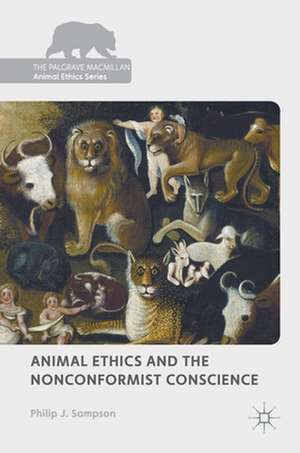Animal Ethics and the Nonconformist Conscience: The Palgrave Macmillan Animal Ethics Series
Autor Philip J. Sampsonen Limba Engleză Hardback – 10 sep 2018
| Toate formatele și edițiile | Preț | Express |
|---|---|---|
| Paperback (1) | 379.48 lei 43-57 zile | |
| Springer International Publishing – 3 ian 2019 | 379.48 lei 43-57 zile | |
| Hardback (1) | 485.24 lei 43-57 zile | |
| Springer International Publishing – 10 sep 2018 | 485.24 lei 43-57 zile |
Din seria The Palgrave Macmillan Animal Ethics Series
- 18%
 Preț: 786.52 lei
Preț: 786.52 lei - 8%
 Preț: 588.34 lei
Preț: 588.34 lei - 8%
 Preț: 538.07 lei
Preț: 538.07 lei - 20%
 Preț: 814.16 lei
Preț: 814.16 lei - 20%
 Preț: 691.10 lei
Preț: 691.10 lei - 17%
 Preț: 524.04 lei
Preț: 524.04 lei -
 Preț: 224.33 lei
Preț: 224.33 lei - 18%
 Preț: 1238.56 lei
Preț: 1238.56 lei - 18%
 Preț: 894.46 lei
Preț: 894.46 lei - 15%
 Preț: 648.24 lei
Preț: 648.24 lei -
 Preț: 384.86 lei
Preț: 384.86 lei - 15%
 Preț: 590.49 lei
Preț: 590.49 lei -
 Preț: 390.63 lei
Preț: 390.63 lei -
 Preț: 482.17 lei
Preț: 482.17 lei -
 Preț: 384.86 lei
Preț: 384.86 lei - 18%
 Preț: 883.75 lei
Preț: 883.75 lei - 18%
 Preț: 727.97 lei
Preț: 727.97 lei -
 Preț: 383.93 lei
Preț: 383.93 lei -
 Preț: 380.45 lei
Preț: 380.45 lei - 18%
 Preț: 737.12 lei
Preț: 737.12 lei - 15%
 Preț: 644.18 lei
Preț: 644.18 lei - 15%
 Preț: 698.15 lei
Preț: 698.15 lei -
 Preț: 385.84 lei
Preț: 385.84 lei - 18%
 Preț: 1111.53 lei
Preț: 1111.53 lei -
 Preț: 380.25 lei
Preț: 380.25 lei - 18%
 Preț: 780.82 lei
Preț: 780.82 lei - 15%
 Preț: 700.94 lei
Preț: 700.94 lei - 15%
 Preț: 639.73 lei
Preț: 639.73 lei - 15%
 Preț: 703.52 lei
Preț: 703.52 lei -
 Preț: 414.21 lei
Preț: 414.21 lei - 18%
 Preț: 787.47 lei
Preț: 787.47 lei - 18%
 Preț: 723.24 lei
Preț: 723.24 lei -
 Preț: 379.68 lei
Preț: 379.68 lei -
 Preț: 383.93 lei
Preț: 383.93 lei -
 Preț: 383.12 lei
Preț: 383.12 lei
Preț: 485.24 lei
Nou
Puncte Express: 728
Preț estimativ în valută:
92.88€ • 100.92$ • 78.07£
92.88€ • 100.92$ • 78.07£
Carte tipărită la comandă
Livrare economică 21 aprilie-05 mai
Preluare comenzi: 021 569.72.76
Specificații
ISBN-13: 9783319964058
ISBN-10: 3319964054
Pagini: 170
Ilustrații: XI, 160 p.
Dimensiuni: 148 x 210 mm
Greutate: 0.36 kg
Ediția:1st ed. 2018
Editura: Springer International Publishing
Colecția Palgrave Macmillan
Seria The Palgrave Macmillan Animal Ethics Series
Locul publicării:Cham, Switzerland
ISBN-10: 3319964054
Pagini: 170
Ilustrații: XI, 160 p.
Dimensiuni: 148 x 210 mm
Greutate: 0.36 kg
Ediția:1st ed. 2018
Editura: Springer International Publishing
Colecția Palgrave Macmillan
Seria The Palgrave Macmillan Animal Ethics Series
Locul publicării:Cham, Switzerland
Cuprins
Chapter 1 - Speaking of animals.- Chapter 2 - Animals, language and ethics.- Chapter 3 - A modern story of animal advocacy.- Chapter 4 - Innovation and religious discourses.- Chapter 5 - Creation: what on earth are animals for?.- Chapter 6 - Fall: animal suffering and human agency.-Chapter 7 - Redemption: hope, love and restoration.- Chapter 8 - A persistent language.- Chapter 9 - Nonconformist bricolage.- Index.
Recenzii
“This is an innovative book that presents a largely unknown tradition of Christian thought that not only influences contemporary perspectives with regard to animals, but challenges conventional hang-ups stemming from enlightenment and neo-Darwinian reason. It will be of interest within both secular and religious circles, and to those working in animal ethics and more broadly within animal studies and environmental humanities.” (Reading Religion, December 19, 2019)
Notă biografică
Philip Sampson is a fellow of the Oxford Centre for Animal Ethics, UK. His previous publications include Faith and Modernity (1997); Six Modern Myths (2001); and contributions to several edited volumes on animal ethics and philosophy.
Textul de pe ultima copertă
This book explores the religious language of Nonconformity used in ethical debates about animals. It uncovers a rich stream of innovative discourse from the Puritans of the seventeenth century, through the Clapham Sect and Evangelical Revival, to the nineteenth century debates about vivisection. This discourse contributed to law reform and the foundation of the RSPCA, and continues to flavour the way we talk about animal welfare and animal rights today. Shaped by the "nonconformist conscience", it has been largely overlooked. The more common perception is that Christian “dominion” authorises the human exploitation of animals, while Enlightenment humanism and Darwinian thought are seen as drawing humans and animals together in one "family". This book challenges that perception, and proposes an alternative perspective. Through exploring the shaping of animal advocacy discourses by Biblical themes of creation, fall and restoration, this book reveals the continuing importance of the nonconformist conscience as a source to enrich animal ethics today. It will appeal to the animal studies community, theologians and early modern historians.
Caracteristici
Argues that debates about animal ethics draw on the linguistic resources of the prevailing culture Offers a compelling analysis of the religious shaping of contemporary animal discourse Uses primary sources to demonstrate the enduring influence of "nonconformist conscience"
